Body Image
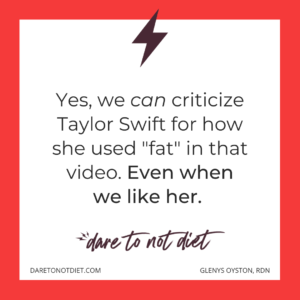
We need to change the culture to stop seeing fat bodies as the worst thing someone can be
By now it’s old news that Taylor Swift’s video for the song Anti-Hero contained the word “fat” in a derogatory way. Or at least the fat liberation world (me included) felt it was derogatory. I want to explain why, and why it’s okay to criticize this.
I had an instant ick moment the minute the scene flashed by. At this point I was just watching the video and I had not heard of any controversy. I sighed and turned off the video. I was done being reminded that fat bodies are everyone’s worst nightmare for the day.
The next day I saw this brilliant article. Yes! Someone else saw that “fat” on the scale! I wasn’t the only one who felt deflated after seeing it!
I posted the article to Facebook. Many of the comments were in agreement – there was a better way to illustrate how Taylor thought about herself and her body without throwing fat people under the bus.
Being fat is many people’s reality. We now know that without a doubt, body size is not a choice and not permanently alterable for the majority of people.
But as expected, not everyone agreed with this point of view. Some folks were upset that someone was criticizing Taylor’s efforts at an autobiographical song. These folks felt that because the song was personal, it was beyond criticism.
Except once you write, record and release a song for sale, it’s no longer personal. It’s commerce. And it’s okay to criticize art and anything else for sale. So, like others already have, I’m going to criticize this tiny little part of a video because I feel it upholds harmful ideas about body size in a very obvious way. (just as people have every right to criticize what I am saying here)
I know that many people with eating disorders see themselves as “fat” even when they aren’t. And in treatment, I want people to speak freely in the words that are theirs, without worrying about hurting my feelings.
But when working with my clients in treatment for their eating disorders and disordered eating, I also have the chance to go deeper with people. To explore what “fat” actually means to them, to deconstruct fat-as-bad, to get someone to name the real feelings they are really experiencing (fear of rejection, humiliation, shame, etc.) and to discuss the very real problem of weight stigma and discrimination. And it’s not public.
The video (in its original form) for “Anti-Hero” isn’t therapy and doesn’t allow for any of that exploration. We’re just quickly told that being fat is Taylor’s worst nightmare. We get why, because weight stigma is real.
But many of Taylor’s fans are fat and will be informed that their bodies are the nightmare. Was that the intention of this scene? Probably not.
(Ironically the song itself has no mention of weight fears although her history of having an eating disorder is well-known.)
The Culture Can change
And then…the video was changed (at least in one place so far). Based on one Twitter thread and one Facebook post I saw, many people are very angry about this. Sometimes change makes people unhappy.
I don’t know if she should have changed it. I don’t think we should go back and erase all the stuff that we’ve moved on from as a culture. We need to see where we’ve come from. I appreciate the ability to critique and discuss why it’s shitty to fat people because my interest is in changing the culture. And we can critique artists and institutions when we feel they’ve done something to uphold ideas that continue to hurt many people.
And she didn’t have to change it – she’d still be just as popular if she hadn’t. That was completely her (or her team’s) choice based on the goal of the video (marketing and promotion vs art). Whether she did or didn’t is beside the point.
The bigger point is that we need to change the culture so we stop seeing fat bodies as the worst thing someone can be, and we do that through critique and speaking out.
Cultural mores do change over time, sometimes because people rattle cages and then others change how they think as a result. Many fat people are tired of being the punchline at best and discriminated against at worst, and we’re speaking up. Everyone has the right to criticize and those criticized have the right to respond however they want to. That’s how a free society works.
We are also still allowed to like Taylor Swift even if we feel she’s made a mistake. And I still do!
You may enjoy this TikTok which articulates both sides so well. I’m with the “girl-with-laptop” on this one. Were we supposed to feel uncomfortable?
Tired of hating your body? Get my free guide, 6 Quick Strategies to Improve Your Body Image Now.
Body Image
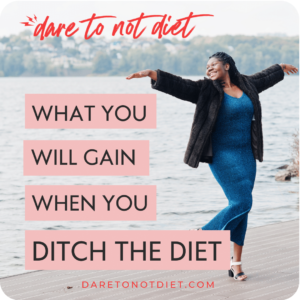
Perhaps you’ve been hearing all about intuitive eating these days and you’re considering ditching your diet at last. Excellent decision!
It should be no surprise by now that dieting is harmful. But in case it is, here is a quick recap: Most people (up to 95%) regain some, all or more weight than they lost in the first place. This is really the least harmful effect of dieting, because it’s your body saving your life from starvation.
The more detrimental effects are:
- Chaotic eating
- Nutrient deficiency
- Loss of lean body mass (muscles and bones)
- Energy depletion
- Food obsession
- Orthorexia
- Anxiety, decreased self-esteem, depression, irritability, and nervousness and physiological stress
So if you are sick (maybe literally) and tired of the terrible diet cycle, here are just a few reasons to quit dieting forever.
Reasons to ditch your diet
You’ll stop obsessing over food
You know all that thinking about food you do when you’re losing weight or maintaining weight loss? That’s because you’re hungry. Or because you feel bad about eating certain foods. Both physiological and mental restriction cause a feeling of deprivation, which your brain and body want to solve by eating everything. Once you start eating to appetite and honoring hunger and fullness cues, that food obsession will disappear and you’ll have so much more time to think about other things. It can take some time and practice to come into alignment with those cues, so don’t try to rush this process.
You will stop feeling guilty and eat all foods normally
Without any foods off-limits, you’ll start to actually enjoy the food you eat, which can now be any food. Wouldn’t it be nice to kick back with a delicious pizza and just relax and enjoy it? Have some ice cream without feeling bad the rest of the afternoon? Yes, you will learn to do that. And you’ll eat them in amounts that are right for your body because you’ll be listening to your body.
You’ll have more energy
Food is what gives you energy and you will have more of it when you are eating intuitively! Especially when you include more carbohydrates! Thanks to the disastrous low-carb/no-carb trend of the past 20 years, most dieters skimp on carbs all day. Many of my clients blame their energy depletion on weight gain. But when they start to eat enough again, they stop feeling so exhausted. Imagine what you could do with just some of that energy!
You will be healthier
Intuitive eating and eating competence are both validated models that show that people are healthier when they eat this way. Over the long term, as people really settle into normal, sustainable eating patterns, we see improvements in most health markers. For conditions that require some gentle nutrition, that can be accomplished more easily when you’re eating enough food.
Your self-esteem will improve
This one happens with intentional work. Basing your worthiness on your ability to attain thinness leads to fleeting self-esteem at best. Instead, you can develop body appreciation and recognize that weight stigma, not your body, is the problem. You can base your worth on the person you are, not what you look like. This is the reason I also include body image coaching in my work.
You will stop the cycle of weight loss and regain
Gaining weight over a lifetime is normal. But a wildly ping-ponging weight due to dieting has been shown to be detrimental. Stable weights are typically correlated with lower mortality rates. Without weight cycling, the changes will more likely be smaller and incremental compared to the weight change that happens with weight cycling (aka yo-yo dieting).
You’ll gain so much time to do the things you want to do
On a diet, you might spend a lot of time managing and obsessing about your food. When food becomes just another piece of routine self-care, you’ll think just enough about it to get yourself fed well. Then you’ll have leftover time to plan and do the things you want in life. Active body image work will help you to stop waiting to be a certain size to really live life fully.
Let’s face it: dieting makes no one happier or healthier in the long run. It doesn’t work and it harms your health. It’s time to ditch the diet. With a little effort, you’ll see the benefits are worth it!
Need some help eating normally and feeling better about your body?
If you want to explore what a life free of diets could look like for you, book a free consultation now and we’ll talk.
Start your path to normal eating with my free guide, 5 Strategies to Stop Overeating
Body Image
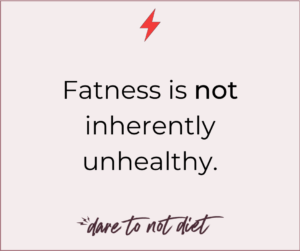
Let’s talk about the lie that fat bodies are inherently unhealthy.
The whole, complex and nuanced truth is: fat bodies can be unhealthy or healthy. Thin bodies will be unhealthy or healthy.
In our current society, however, we will blame poor health on fatness, and good health as a result of thinness.
This is called weight stigma.
Janet Tomiyama’s research showed the uselessness of BMI in determining health status. BMI as a diagnositic tool dramatically over-diagnosed fat people as unhealthy and under-diagnosed thin people as unhealthy. Clearly, using BMI helps no one at the doctor’s office.
Fat bodies are often under attack from childhood. Chronic food restriction, over-exercising, weight cycling and the effects of weight stigma are harmful to health. Studies that correlate illness with fatness rarely consider the effects of chronic dieting and weight stigma. These are confounding factors.
Behaviors (such as exercise) — more than size — have a greater impact on health, and the evidence is clear on this. That means eating well and fitness and taking care of the various other parts of life can support our health. Many people can do this. Many can’t. As always, health is not a measure of anybody’s worthiness.
Let’s remember: Health is complicated and means different things to different people and is not always 100% within our control.
Ignore the lies of diet culture that tell you fatness is inherently unhealthy and cause you to do worse things for your health (like dieting). Do your best with doing healthy things (which do not include restriction) and leave the rest — like size and shape — up to your personal biology.
Need help with eating?
Wondering where to start with working on “health?” If years of dieting has left you with a chaotic relationship to food, that’s the place to begin. The Peaceful Eating Jumpstart small group coaching program starts September 6 and is filling up fast! Come and join us if your eating needs help! Details here.
Start your path to normal eating with my free guide, 5 Strategies to Stop Overeating
Body Image
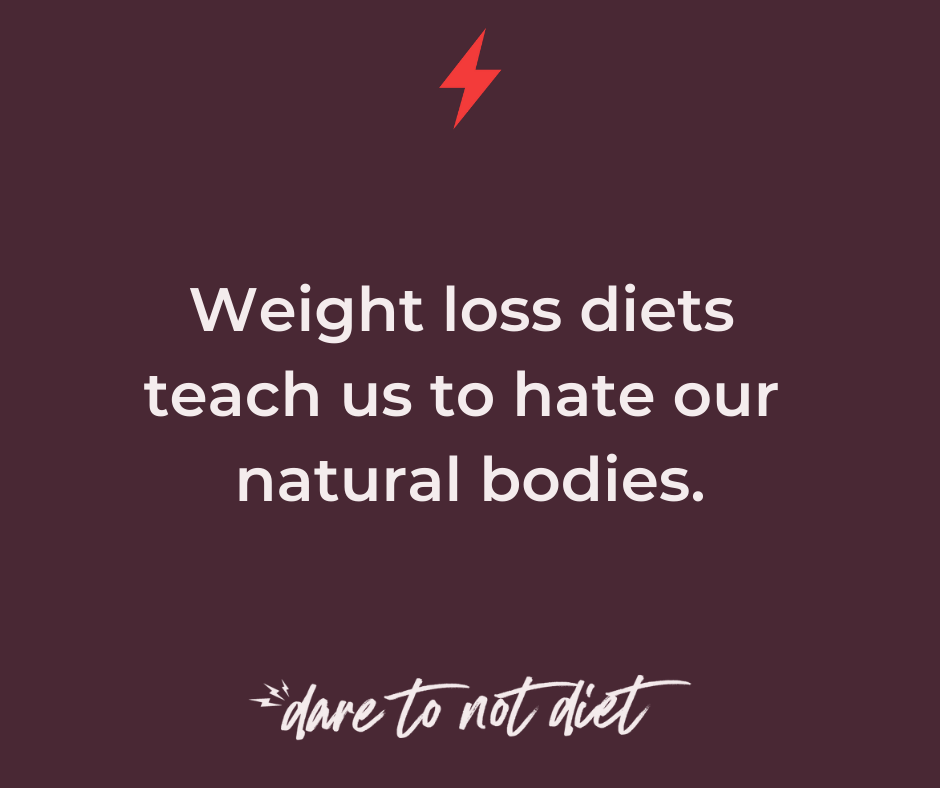
The problem with improving how you feel about your body by losing weight is that it teaches you that there is only one good way to have a body.
This way is:
The smaller body is a good body. The larger body is the bad body.
And since intentional weight loss efforts (aka diets) have such a dismal success rate (less than 5-10% for most people will keep weight off long term), there is a very good chance that you’ll eventually end up in your larger body again.
Sadly, our society reaffirms thin=good, fat=bad, so you’ll get plenty of compliments as you lose weight and none as you gain.
(even if you are healing from an eating disorder or disordered eating as you gain weight. Almost no one will congratulate you on this)
Dieting teaches us that if *normal* eating doesn’t make us thinner, we are doing something wrong.
Because dieting teaches us that fat bodies are wrong.
So if you feel bad about your body, look to a culture that expects conformity with narrow and unrealistic body standards. Look to diets.
There is a way out of this, which is body image healing.
This is not easy or fast work. It takes time and practice. It takes challenging and changing unhelpful beliefs. But it IS achievable, and so worth it.
To help you get on your way to a better body image, I created a FREE guide with some quick strategies you can use to start increasing your body image resilience today.
Body Image
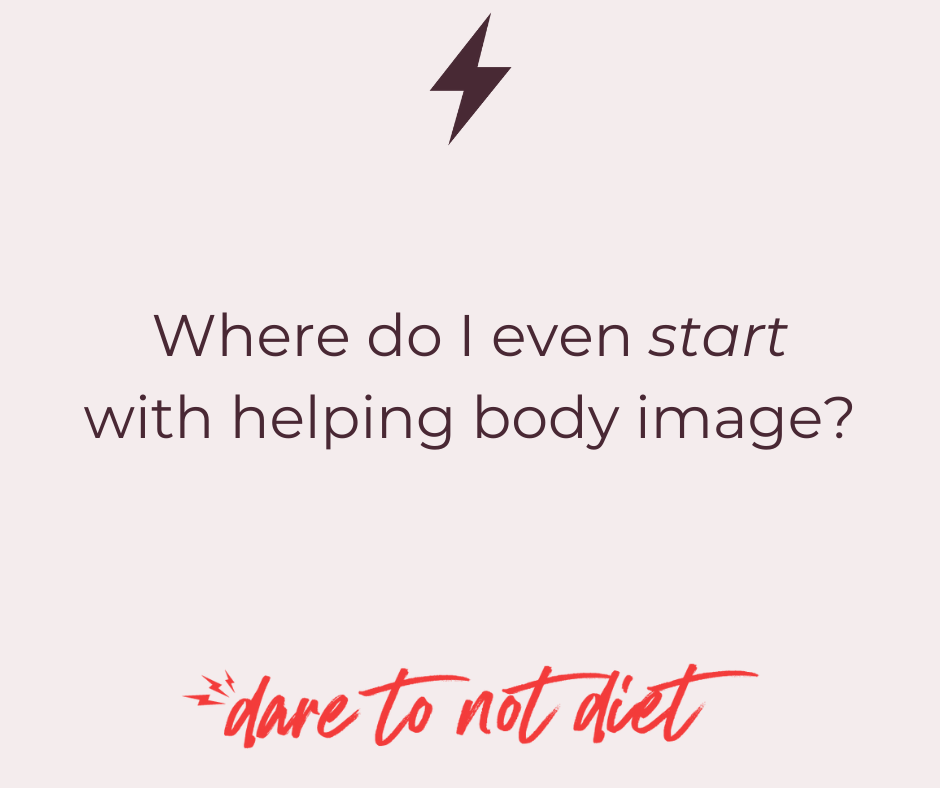
This is just a quick PSA to say that improving your body image is possible.
(even when it feels like it isn’t)
It is not easy.
It takes undoing harmful beliefs and learning new tools.
It means realignment from needing to like how your body looks to knowing your body IS good.
It takes practice. Sooo much practice.
You don’t have to know everything to start. Here are some low-hanging fruit ideas to get you going:
- Listen to fat-positive podcasts (like Dietitians Unplugged!).
- Read fat-positive books about body image.
- Follow anti-diet and fat-positive social media accounts (there are sooo many).
If I were to pick one resource that would be super helpful right now, I’d say this podcast we did with Kristina Bruce about challenging unhelpful beliefs is at the top of the list.
I also recently created a guide with some simple practices that can help get you on your way: 6 Quick Strategies to Improve Your Body Image Now.
With practice and a ton of self-compassion, body image healing is possible.
Body Image
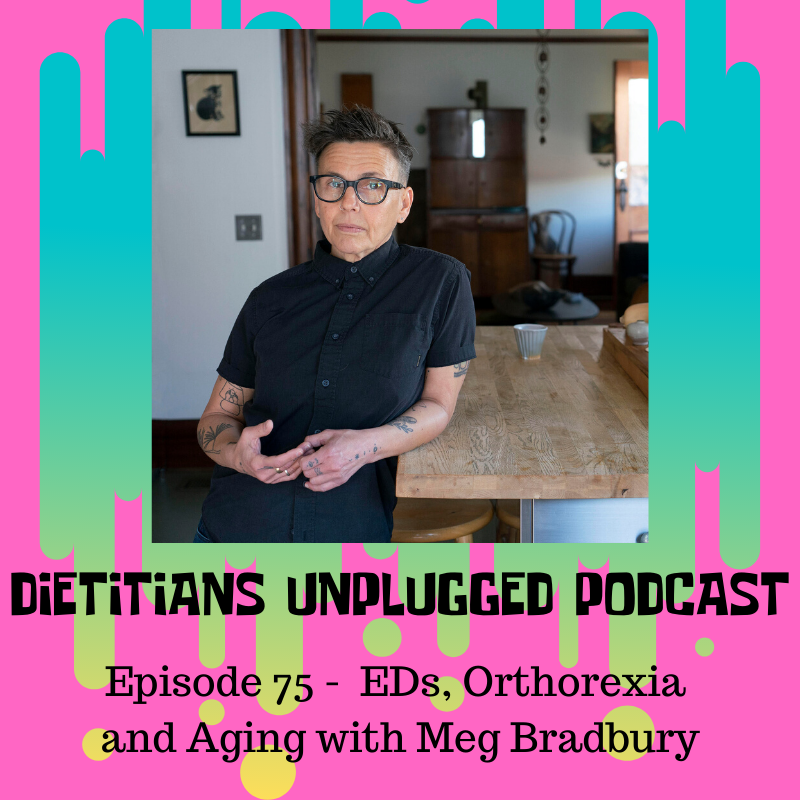
When we think of eating disorders, we so often imagine someone who is younger and struggling. After all, aren’t we supposed to have our lives completely figured out by the age of 35?! (spoiler alert: no)
Meg Bradbury joined us in this Dietitians Unplugged podcast episode to discuss her experience of having an eating disorder and orthorexia as an older person.
Meg Bradbury is a Certified Body Trust Provider®, anti-diet nutritionist, Accessible Yoga® Teacher, and registered Yoga Alliance yoga and meditation teacher. Meg is in private practice working with individuals, groups, and families, advocating for body acceptance, eating disorder/disordered eating/body shame recovery, freedom with food, joyful movement, and stillness/breathwork. She also co-leads the Elderqueer project, an online gathering space for 40+ queers to connect and build community through conversations about aging in body, relationships, emotions, transitions, trust, and cultural relevance. Meg’s practice is fat positive, weight neutral, and LGBTQIA+ affirming.
In this episode, we discussed:
- Meg’s experience of developing an eating disorder
- What is orthorexia, and how it took over her life
- Why orthorexia has become so pervasive in our culture
- The effects of aging on eating disorders
- The tyranny of the anti-aging industrial complex
- Using breath and yoga to connect with the body
Like our podcast?
Make sure to subscribe on Apple podcasts (or wherever you listen to podcasts) and leave us a review. This helps to spread the non-diet love far and wide.
Subscribe and get my free guide:
Why you overeat …and what to do about it
Click here if you just want my newsletter!
Body Image
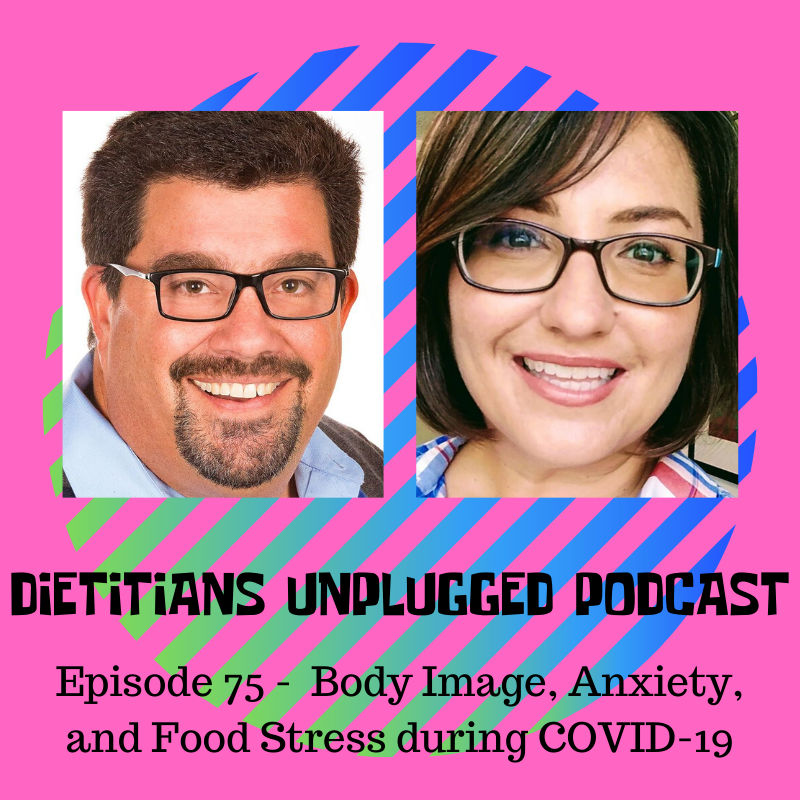
Aaron and I reached out to you from home during the global COVID-19 pandemic in this episode of the Dietitians Unplugged podcast. This is clearly a time of stress and fear for everyone, and it can really bring up a lot of distress around body image, food insecurity and scarcity, and eating in general.
In this episode we discussed:
- Our personal experiences of navigating scarcity at the grocery stores and the emotional roller coaster we’ve both been on
- The hard work and ingenuity our clients and so many others are putting into their healing while stuck at home
- The uptick in body image issues and how many of us use worries about food and body as a way to control anxiety and distract from bigger worries
- Dealing with anxiety and difficult feelings during this time
- How we can use this time to feel better about our bodies
- How some people actually find themselves thriving in the slowed pace
- How diet culture doesn’t go away even in extreme times of uncertainty and worry
Show Notes:
Virtual meal support on Instagram: @covid19eatingsupport
Article: Why You Should Ignore All That Coronavirus-Inspired Productivity Pressure – great advice for dealing with traumatic times
Headspace is offering free support during the global pandemic
Other meditation apps: Insight Timer, Calm
Listen on:
Subscribe and get my free guide:
Why you overeat …and what to do about it
Click here if you just want my newsletter!
Body Image
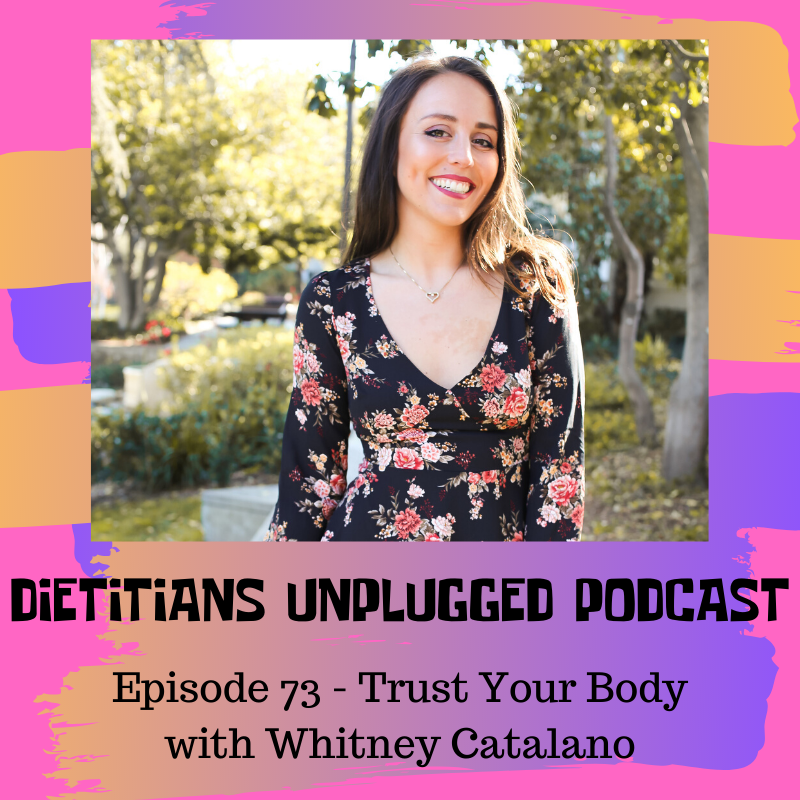
In episode 73 of of the Dietitians Unplugged podcast, Aaron Flores and I were joined by Whitney Catalano, RDN. In this episode, we discussed:
• What it means to learn to trust our bodies
• Tackling emotional and binge eating
• Dealing with the weight-stigma that can show up when visiting medical providers
Show Notes:
Learn more about Whitney Catalano
Listen on:
Subscribe and get my free guide:
Why you overeat …and what to do about it
Click here if you just want my newsletter!
Body Image
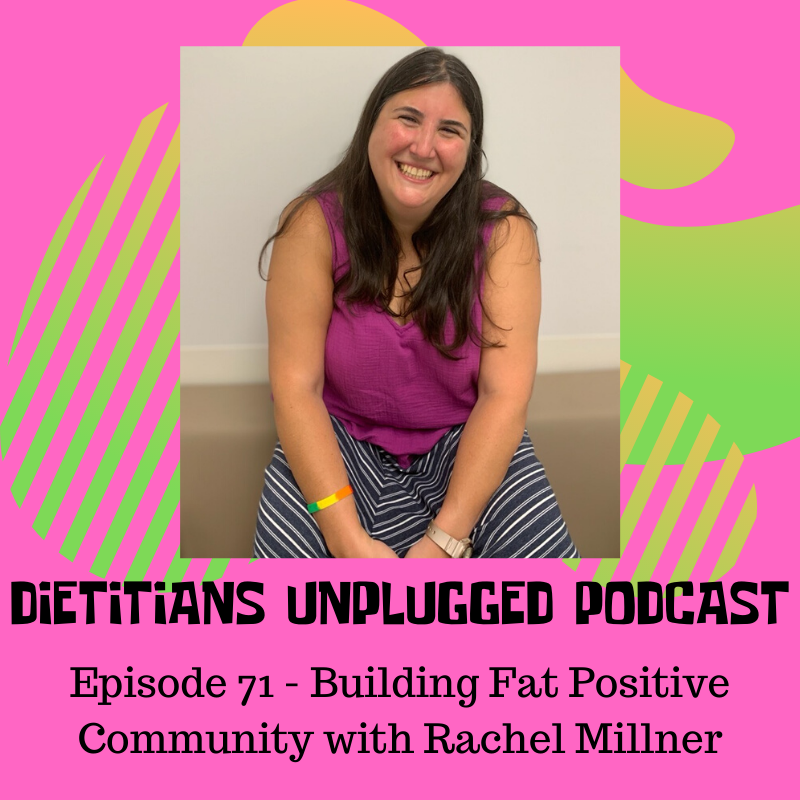
We are social creatures, and community is important. But when you are divesting from rampant diet culture and are in a larger body, how do you find community when so many people are spouting off about their current diets and body dissatisfaction?
On the Dietitians Unplugged podcast recently, we discussed this issue with our colleague, Dr. Rachel Millner. She shared with us her thoughts on the importance of fat-positive spaces for clinicians and individuals and how weight stigma continues to negatively impact those working on healing from their eating disorder.
Rachel Millner, Psy.D., CEDS-S, CBTP (she/her) is a psychologist/activist, a Certified Eating Disorder Specialist and Supervisor, and a Certified Body Trust Provider. Dr. Millner has been practicing as a psychologist since 2005 and has been specializing in treating people with eating disorders throughout her career. Dr. Millner works with people struggling with all eating disorders as well as those trying to break free from diet culture. Dr. Millner is a fat positive provider who works from a Health at Every Size® and Body Trust® lens.

Show Notes:
Dr. Rachel Millner’s website
Follow Dr. Millner on Instagram
Be the first to hear about the Self-Care for Diabetes program (Launching in early 2020)
Listen on:
Subscribe and get my free guide:
Why you overeat …and what to do about it
Click here if you just want my newsletter!